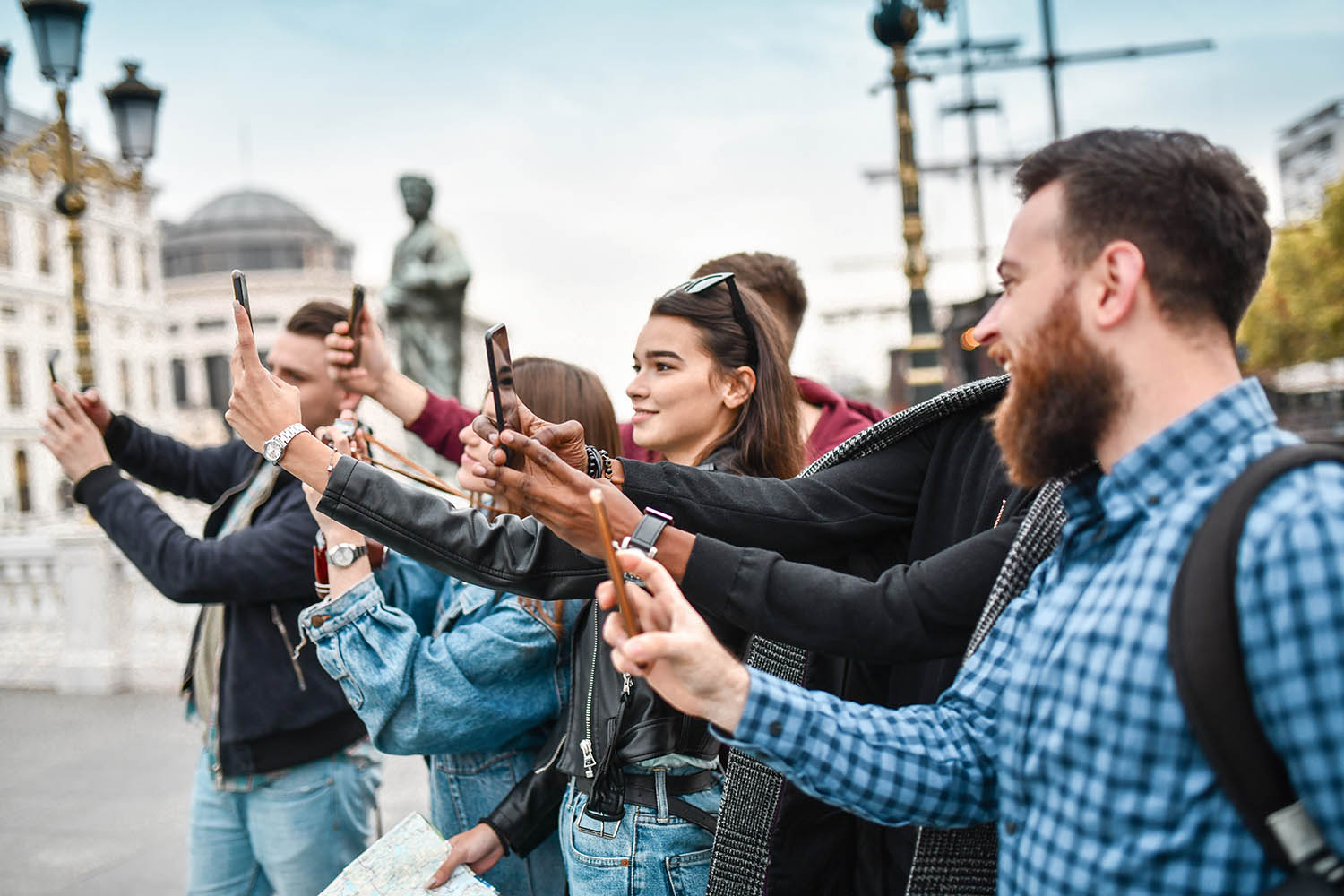My stomach dropped. A groan escaped. I clicked a headline and scrolled frantically, looking for the last thing I wanted to see. I heard myself whisper “no” as I realised the worst had happened: a newspaper had included my neighbourhood on a list of quiet areas for tourists to visit to escape the crowds at the Edinburgh Fringe.
Living in Edinburgh during festival season is a reality of extremes. You watch as former safe havens erode into packed out “hidden gems”. Favourite busy-but-bookable restaurants turn radioactive with zero availability. Ordinary tasks – walking the dog, going to the post office – suddenly feel like bracing against a storm. Suitcases rolling down the street at all hours remind you that one in 10 homes in the city is an Airbnb.
August here wasn’t always like this. While, yes, the centre would become a throng of endless tourists, residents who lived more than half a mile from the castle existed in relatively untouched enclaves, free from tour groups and flyers. If you really wanted to, you could opt out of the festival entirely. You only needed to contend with those 3,000 shows and 265 venues if you chose to cross the Rubicon of the city centre.
What’s changed? Here’s one answer: the supposed democratisation of knowledge online – that people are more eager and willing to share once-guarded information about the best places to visit and what to do once you got there. The cardinal sin of concealing this guidance has been labelled as “gatekeeping” – a snobbery of sorts, not letting others in on the secret to everything (and anything) good in your life.
Not naming the affordable hotel you stayed at isn’t just seen as selfish, but damaging to those “without access”
Not naming the affordable hotel you stayed at isn’t just seen as selfish, but damaging to those “without access”
Once used solely to describe systemic, institutional power, gatekeeping is now an accusation thrown at those who decline to share their skincare routine; weight-loss regimen; best margarita recipe. The backlash to gatekeeping is especially strong when it comes to travel. Not naming the affordable hotel you stayed at isn’t just seen as selfish, but damaging to those “without access”.
The principles of anti-gatekeeping make sense when it comes to dinner party tips or how to break glass ceilings. But for holidays, it has triggered an inevitable new stage of overtourism. The tourist dams are breaking and spilling out into liveable neighbourhoods, which are now rapidly mutating into social media hot spots. This effect is happening acutely across Europe. Being Greek, I have watched islands that 15 years ago enjoyed healthy tourism – ones like Paros, Naxos and Milos – transform into overrun new Santorinis. In my family’s own untouched part of the Peloponnese, there is fearful handwringing about potential development, like it’s an incoming tsunami. (Filming of Christopher Nolan’s The Odyssey nearby has made this concern balloon.)
These places, like Edinburgh, aren’t endless sprawls, but finite spaces being choked by viral focus. And while there are plenty of second, third, even fourth cities that would benefit from boosts in visitors to generate business for struggling communities, what we’re instead seeing is places already buckling under the weight of tourism becoming even more clogged, and in the few habitable spaces they have left.
Our impulse to visit “authentic” places, particularly in the summer, is understandable. Who wants to fit the image of a gullible, naive tourist visiting the Disney version of another country? But our current culture tells us that discovery is equal to entitlement; that, in finding somewhere less obvious, we aren’t like other tourists – deserving the clout and praise we’ll get by letting others in on our exciting secret. (I’m guilty of this rationale too, where it’s convenient to invoke my Greek passport to suggest my footprint is like a local, not a traveller.) It’s easier to ignore the downsides of spoiling unspoiled places when you’re not the one at the sharp end.
But we may be at the beginning of a subtle shift, stemming this trend from spinning completely out of control. It’s become increasingly common to spot a viral video of an idyllic island or a secluded mountain town (one that would previously come with a lengthy itinerary in the caption) and see the poster refusing to share the location with pleading, angry commenters. Even though it’s unfashionable, and is almost guaranteed to get you a furious response online, gatekeeping may be a way to claw back something like balance, or even just a way to mitigate any greater tolls.
The answer isn’t to avoid travelling to anywhere unusual, or to only go to bad restaurants and crowded sites. When I see out-of-towners at my favourite wine bar or buying a sandwich from my local deli, part of me is glad to know people are learning there’s more to Edinburgh than twee; that it does have an electrifying buzz during these three weeks of August. But the reality is also that, whether it’s Milos over Santorini, Stockbridge over the Old Town, no authenticity marker will change the fact that you’re a visitor. Those of us with the keys to places that have been spared for real locals should feel no guilt in pointing tourists towards the beaten path.
And another thing… Precious lips, better beans, funny women
Lip service I’ve spent the past week digging out the final precious dregs from my tube of Violette_FR Bisou Jelly lipstick. As someone who likes makeup, loves colour, but rarely has an excuse for a fully lined lip, the balm-meets-rouge formula is the perfect amount of minimal, but lasting pigment – and sadly, well worth the inflated price. My preferred shade, Aïssa, is a universally flattering berry.
Bean feast My journey to becoming vegetarian has been turbocharged since discovering that beans can actually taste good, thanks to the nice work of the Bold Bean Company. My partner has had ridiculous success making us coq-less au vin with the white beans; for my part, I’ve had to struggle to stop myself from eating the black chickpeas straight from the jar.
Sister act I won’t gatekeep my favourite Fringe show, which so far has been the comedy duo, Siblings. These are two nepobabies (the daughters of Ruby Wax) worth your time. I saw them by accident last year when they did a 10-minute set in the middle of another group’s quintessentially bad improv and had me in tears within seconds. This year’s hour is even weirder, smarter and funnier – and will be touring the UK once Festival finishes at the end of August.
Photograph: Getty images
Newsletters
Choose the newsletters you want to receive
View more
For information about how The Observer protects your data, read our Privacy Policy



